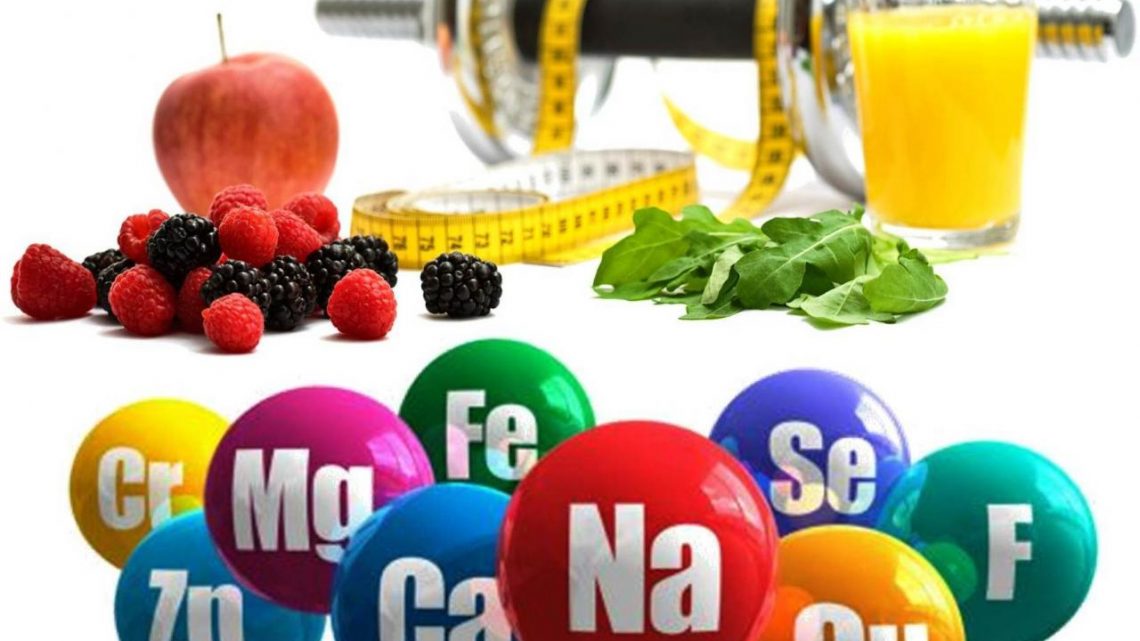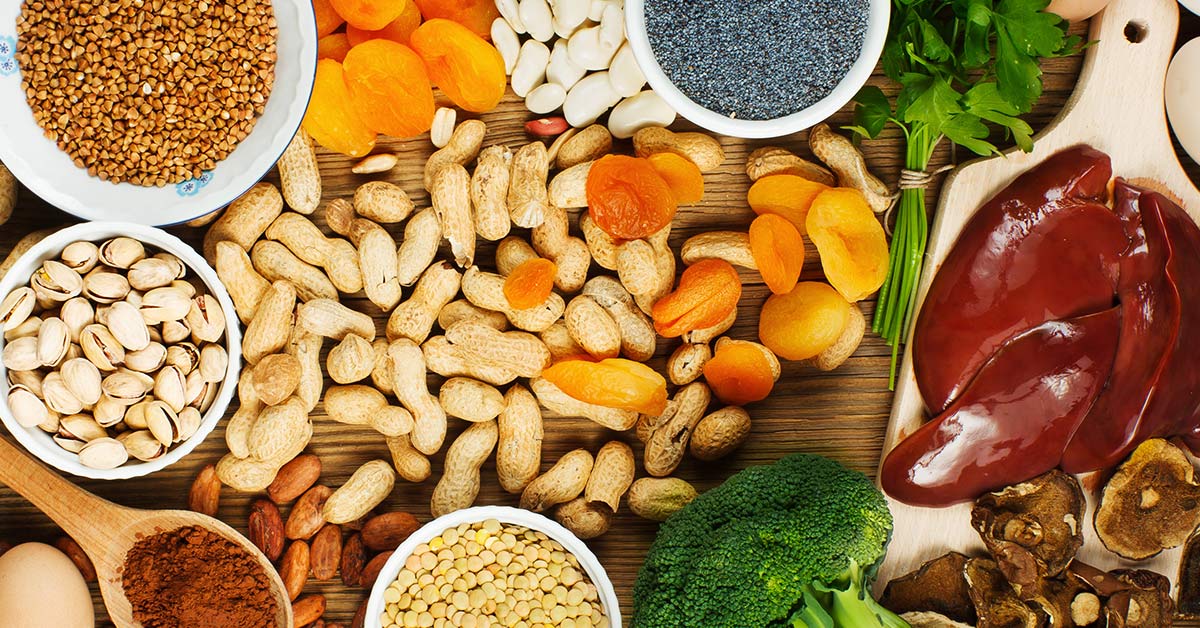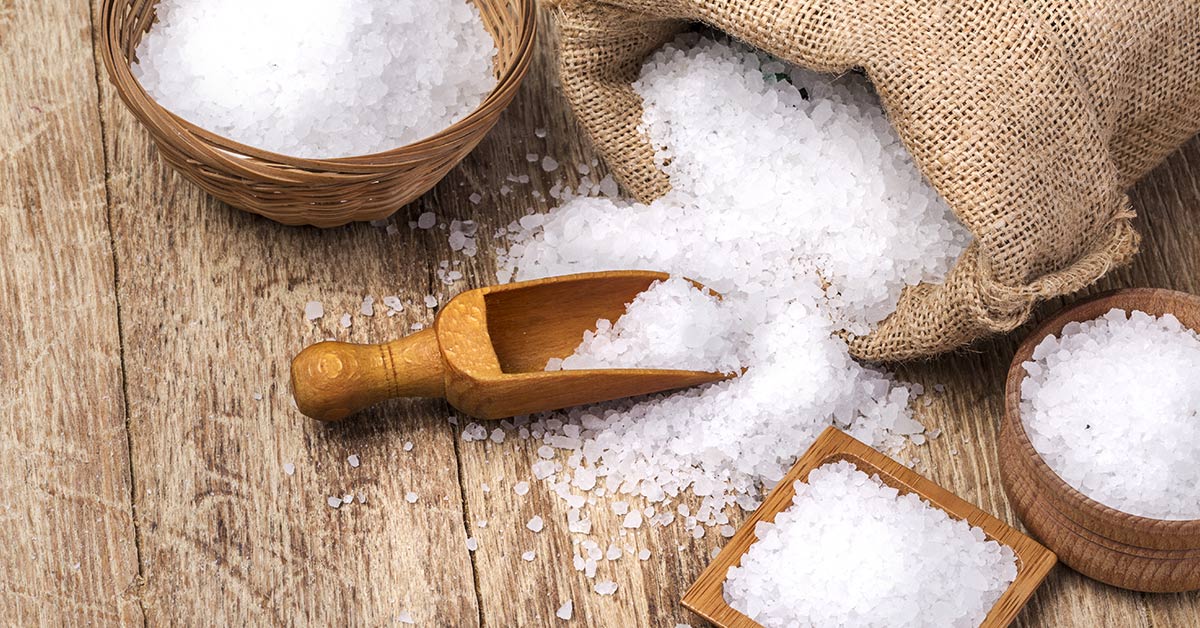THE 10 MOST IMPORTANT MINERALS FOR ANYONE WHO DOES STRENGTH TRAINING
May 20, 2021If you are serious about strength training, you know how important good nutrition is. You make sure you get enough protein to feed your muscles. You eat enough carbohydrates so that your glycogen stores are replenished and you have energy in the gym. You provide a healthy amount of fats that support the functioning of your body. But did you know that providing your body with sufficient micronutrients is just as important? Vitamins and minerals are not only important to keep your body healthy, but also determine how you perform in the gym!
MINERALS
On to the next category: the minerals. Vitamins and minerals are often mentioned in the same breath and therefore have many similarities. The main difference between the two is that vitamins occur in living nature, while minerals come from dead nature. That sounds a bit raw, but it simply means that they must be absorbed by plants from the earth and by animals from food or water.
A sub-category of minerals are the trace elements. The biggest difference between minerals and trace elements is the amount you need, with trace elements this is considerably less. However, that does not mean that it is easier to get enough of this, because trace elements usually also occur in lower amounts in your diet.
CALCIUM
The first mineral that is indispensable for every athlete is calcium. It is also one of the best-known minerals, because almost everyone knows that calcium contributes to the maintenance of strong bones. Not unimportant when you do strength training, because the prevention of injuries and joint problems should be at the top of your priority list. But beyond those well-known benefits, there’s more to be said about calcium. Below we list the most important features you should know:
- Calcium is good for the skeleton
- Calcium is important for normal muscle function
- Calcium is important for the nervous system
- Calcium helps to release energy from food
As you can see, calcium plays an indispensable role in strength training, so it is not for nothing that dairy products are so immensely popular in the fitness world!

HOW DO YOU GET ENOUGH CALCIUM?
Probably one of the easiest questions in this article to answer and you probably know the answer yourself: eat dairy. Whether you are talking about cottage cheese, yogurt, milk or cheese, they are all extremely rich in dairy. Now, especially in recent years, dairy has received a lot of criticism, with the result that many people have cut back on dairy or even stopped eating it altogether. Now it is not impossible, but very difficult to get enough calcium without dairy.
So ask yourself if this is worth it to you. If you actually have a lactose intolerance or even cow’s milk allergy, it is the logical choice. If neither of these is the case and you are functioning fine on dairy, there is probably little reason to cut it completely from your diet.
Other sources of calcium include fatty fish, vegetable vegetables and white beans. If you cannot or do not want to eat dairy and find that you are not getting the above products on a daily basis, consider a supplement with calcium .
Bonus tip: Vitamin D stimulates the absorption of calcium in the body. So combine these 2 for the best effect.
IRON
The next mineral that you absolutely do not want to be deficient in is iron. You may have heard that you should be careful with an excess of iron because it can be toxic, but you don’t want a deficiency either!
Iron helps in the normal formation of red blood cells and hemoglobin and the latter is precisely the protein that transports oxygen in your body. Yes, also the oxygen to your muscle cells that it can use so hard during those last reps.
Iron deficiency is not a problem for someone with a carefully composed nutritional plan, but in certain situations it is important to pay extra attention to this as we will explain in a moment.
But first about iron itself, here’s what else it does in your body:
- Iron is good for the cell division process
- Iron is important for energy metabolism
- Iron helps to reduce fatigue
- And we already mentioned it, but iron therefore contributes to efficient oxygen transport
So if you notice that you are easily tired and cannot get the most out of intensive (endurance) training, there is just a chance that you have a shortage of iron from your diet.
HOW DO YOU GET ENOUGH IRON?
Getting enough iron is not a major challenge for most people. Iron is mainly found in red meat, eggs, dark green vegetables, dried fruit and nuts. Foods that you often consume enough as a strength athlete.
Who is then at risk of iron deficiency? These are mainly vegetarians and vegans. Despite the fact that there are plenty of plant sources of iron, in practice it seems more difficult to get enough of this if you do not eat red meat or eggs.
A final option is to supplement with iron, but this is usually not recommended without having a blood test first. As we mentioned at the beginning, too high an intake of iron can be toxic to your body, so you don’t want to play your own doctor with this!
MAGNESIUM
Magnesium is a very interesting mineral. It is extremely valuable for athletes, it is found in many different foods and despite that many athletes are deficient in it. How is that possible?
The cause of this is due to 2 things:
- When you exercise intensively, your magnesium requirement increases as it is an important mineral for the functioning of the muscles and protein synthesis
- Most eaten sources of magnesium such as grains, nuts and cocoa are rich in anti-nutrients such as phytic acid. This acid has the property that it adversely affects the absorption of minerals such as magnesium, so that your body cannot absorb all magnesium. Despite the fact that you get enough on paper, this can still be too little
Combine these 2 causes and it soon becomes clear why you as an athlete want to watch your magnesium intake extremely carefully. But first, let’s see what exactly is the function of magnesium:
- Magnesium supports the bones
- Magnesium helps build body protein
- Magnesium contributes to a good electrolyte balance
- Magnesium promotes energy metabolism
- Magnesium is good for the muscles
- Magnesium contributes to extra energy in case of fatigue
As you can see, magnesium offers a huge complete range of health benefits that you as an athlete do not want to miss out on. Muscle cramps during intensive training are sometimes blamed for a magnesium deficiency, but this can have several causes.

HOW DO YOU GET ENOUGH MAGNESIUM?
As mentioned above, many foods rich in magnesium are not optimal for meeting your needs. Consider the following foods that are naturally rich in anti-nutrients:
- Cacao
- Cereals
- Legumes
- Nuts
- Seeds
Of course, the presence of anti-nutrients does not mean that it is of no use to you, but if these are your only sources of magnesium, there is a strong chance that there is still room for improvement.
But what are good sources of magnesium? For this we have to quickly switch to foods that usually contain slightly less magnesium, but of which the absorption is as it should be. Consider the following products:
- Spinach
- Mackerel
- Potato
- Bananas
- Avocado
As you can see, products that most people do not eat every day, so that is exactly why magnesium is such a popular supplement. But here too it is important to pay attention, because not every type of magnesium is the same.
Magnesium oxide, for example, is cheaper, but is also a lot less available. If you are looking for high quality magnesium, look for magnesium citrate , chloride, lactate or aspartate.
POTASSIUM
Potassium is often seen as the healthy counterpart of sodium, an important constituent of salt. It is too extensive a topic to cover in this article, but for now it is good to know that both potassium and sodium play an important role in the water balance and regulation of blood pressure in your body and none of the 2 are necessarily bad is. An excessive salt intake is of course not good for you, but do realize that a sodium deficiency is just as bad.
However, where things go wrong more often is the balance between these two substances. Where the average diet is full of salt (often without realizing it, because ready-made products in particular often contain a lot of salt), the proportion of potassium is usually a lot more limited. It is precisely this imbalance that can cause problems in the body and even have negative consequences for your health.
So instead of eliminating all the salt from your diet (which you can learn more about with the mineral iodine), it is better to work on your potassium intake first.
But what does potassium actually do for you?
- Potassium helps to maintain normal blood pressure
- Potassium is important for normal muscle function
- Potassium has a positive effect on the functioning of the nervous system
In addition to the fact that potassium plays an important role for your overall health, it is also an important mineral to keep you functioning well in the gym.
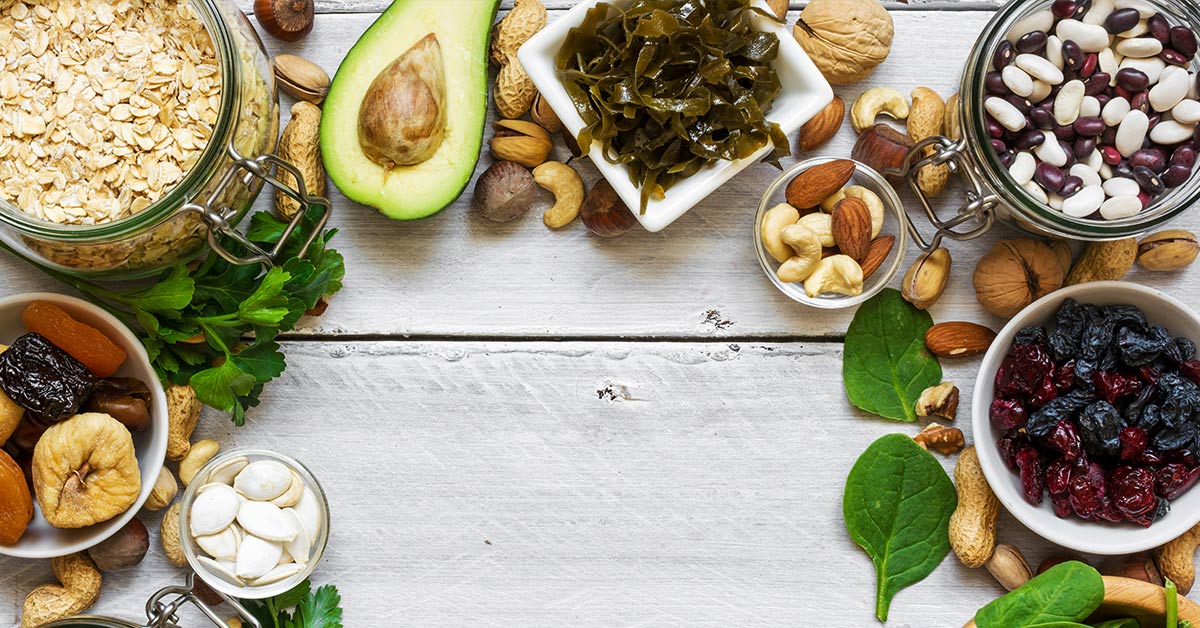
HOW DO YOU GET ENOUGH POTASSIUM?
Potassium is mainly found in (green) vegetables, potatoes, fruit and to a lesser extent in lean meat, grains and nuts.
Foods that are particularly known for their potassium content are bananas, avocados, spinach, beets, (sweet) potato and white beans.
As you can see, it doesn’t have to be difficult to get enough potassium if your diet consists mainly of unprocessed, natural food. Despite this, it can be a difficult task to cover this need, especially during bulk. As you probably know yourself, your focus will automatically shift a bit more towards a higher-calorie diet in order to achieve your daily goals. An automatic consequence is that foods with a high saturation such as vegetables and fruit will receive less attention.
The most important message is therefore to always have your health in place 1, even when you are bulking and have to eliminate gigantic amounts of calories in a day.
Are you naturally low hungry and is it an impossible task for you to achieve this? Then consider taking a daily potassium supplement .
ZINC
Zinc is a popular mineral among strength athletes, and with good reason. In fact, among all the other benefits of zinc, it is one of the few micronutrients that has been shown to contribute to normal testosterone levels in the blood.
Testosterone is the male sex hormone and is responsible for a variety of effects. Good well-being and a major role in building muscle mass are the 2 most important for us. Now, a zinc supplement isn’t going to suddenly turn you into an uninhibited muscle-building machine, but a zinc deficiency is definitely going to affect you adversely.
For that reason, it should always be your priority to naturally optimize your hormone levels. Optimal hormone levels ensure that you get the most out of your potential and, as a bonus, it also ensures better well-being, libido and overall health.
The effect of zinc on your hormone balance should therefore never be underestimated, but for what is zinc more important?
- Zinc plays a role in protein synthesis
- Zinc contributes to normal carbohydrate and energy metabolism
- Zinc helps protect healthy body cells
- Zinc is good for male fertility
- Zinc has a beneficial effect on the cell division process
Add these things together and it quickly becomes clear that zinc, especially for men, is an indispensable mineral that you want to have in order.
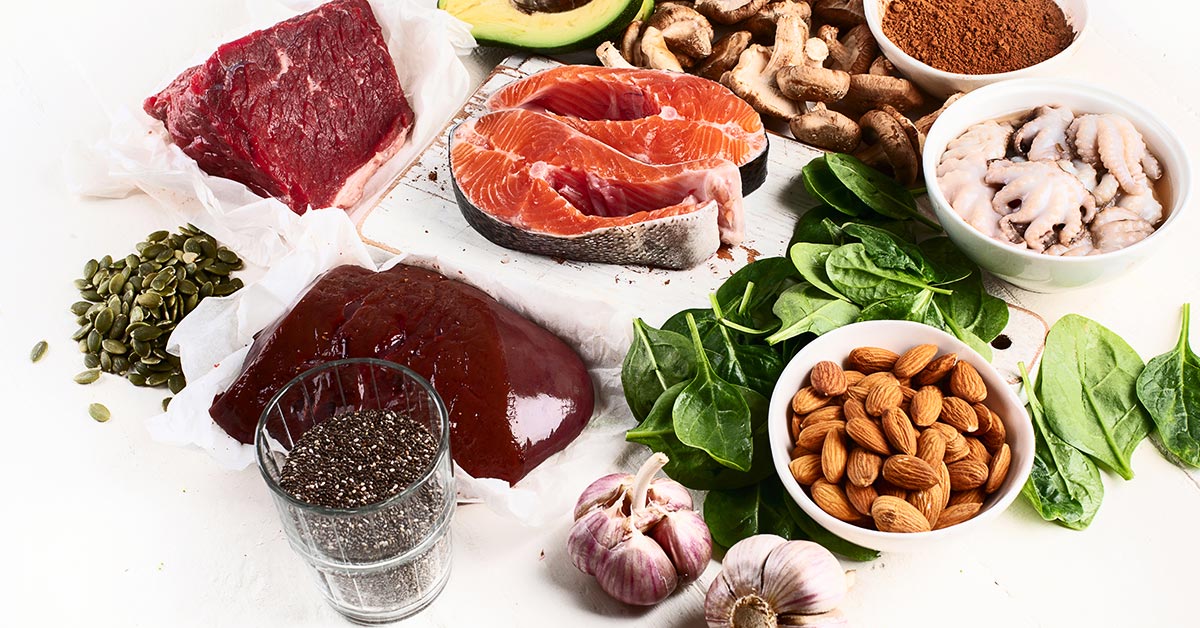
HOW DO YOU GET ENOUGH ZINC?
By far the 2 best sources of zinc are red meat and seafood such as oysters. If you regularly eat a good portion of this, you don’t have to worry about a zinc deficiency. If this is not the case, however, there is a good chance that improvement is possible.
Other sources of zinc such as grains, poultry or nuts usually have a poorer absorption. Either that, or you need massive amounts of it to cover your daily zinc requirement. Because let’s be honest, how realistic is it to eat a kilo of chicken fillet every day to get enough zinc?
Finding out if you have a zinc deficiency is also a fairly difficult task. The greatest amount of zinc in our body is not in the blood, but inside the cells. This does not make blood tests an overly reliable method to find out if you have a zinc deficiency.
Instead, look for one of the following symptoms:
- Bad, dry skin, possibly with acne
- Inflammation around your mouth
- Bad hair quality
If you suspect that you have a zinc deficiency, especially if you eat little or no meat, it is wise to take zinc as a supplement . With this you have covered your needs in one fell swoop and you no longer have to worry about suboptimal hormone levels as a result of a zinc deficiency.
IODINE
The last mineral in this article is iodine. Let’s start right away with the fact that something interesting is going on with iodine. Decades ago, governments around the world discovered that a massive part of the population was deficient in iodine. This had negative consequences, especially for the functioning of the thyroid gland, but also for the functioning of your brain. The solution that was devised then? Adding iodine to a product that can be found in every kitchen: table salt!
This solution quickly proved effective. Iodine deficiency was becoming less common and the matter seemed to be over. In any case, until salt got an increasingly bad reputation people started to use less and less salt. In the same period, ‘healthy salts’ such as sea salt, Himalayan salt and Celtic sea salt gained more and more popularity, which led people to switch to these variants.
The problem with that? The actual benefits in terms of minerals were very disappointing in practice. And to top it off, no iodine was usually added to these salts. As a result, iodine deficiency has slowly but surely become a bigger problem again, especially for athletes trying to avoid salt for their health.
Let’s take a look at what iodine does for you:
- Iodine is essential for the production of thyroid hormones
- Iodine contributes to normal memory and learning ability
- Iodine is good for concentration
- Iodine plays an important role in the functioning of nerves
So no mild claims and especially the first point is very interesting for anyone who wants to improve their body composition. Thyroid hormones play a hugely important role for your metabolism, which means that an iodine deficiency can put a brake on your fat loss.
HOW DO YOU GET ENOUGH IODINE?
Iodine is especially common in foods closely associated with the sea. Seaweed is without a doubt at the top of this, one portion per week can already be enough to cover your entire needs (sushi, anyone??). Alternative foods include cod, shrimp, certain types of dairy, tuna, and eggs. However, the share of iodine in these foods is a lot lower, so you soon have to eat more of it.
The easiest option in practice is really iodized salt. Above you have already learned that salt (specifically: sodium) is not something to be afraid of. Especially not when you also consume enough potassium. By adding iodized salt to your meals, there is a good chance that you will also immediately get enough iodine. Of course, don’t make it too crazy and avoid sprinkling grams of salt over all your food. Your taste senses are your friend, so you will notice quickly enough when something is too salty.
If you belong to the group of people who are hypersensitive to sodium and therefore suffer from high blood pressure, your last option is to take a kelp (seaweed) extract as a supplement.

